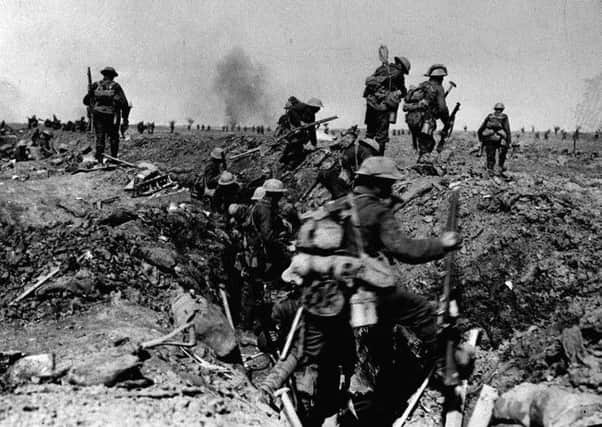Tragedy of the young men killed by their own side


ALVIN Smith went to war for the love of a girl. Twice he had volunteered for the Army. Twice his father had refused to let him go, insisting that he was too valuable as a worker on the family farm in the Yorkshire Dales to be spared for the war.
Alvin obeyed his father, but at Christmas 1915 he was walking with his girlfriend, Amy, in his home village of Lothersdale, near Skipton. “Would you love me if I was a soldier?” He suddenly asked her. “Well,” teased the 17-year-old, in a reply which was to haunt her for the rest of her life, “I might respect you a bit more.”
Advertisement
Hide AdAdvertisement
Hide AdThat was it, he decided to sign up. Over Christmas dinner with friends and family he turned to his best pal, Willie Smith, and said: “We’d better enjoy this Christmas, Willie, because we probably won’t see the next one.” “There was nothing dramatic about the way he said it,” Amy told me many years later.
Alvin and Willie enlisted together in January 1916, as privates in the Duke of Wellington’s Regiment (West Riding). Within a few months both were dead. He perished in a successful attack on German lines and yet no one in the family ever talked about it. Alvin was my grandfather’s brother. When I asked my grandmother how he died she told me: “One of the soldiers went back for water. When he got back to the trench, Alvin and all the others had been blown to bits.” An uncle told me he had heard that on the morning after the attack the sergeant-major had ordered the men to go on parade but they had refused and thrown down their rifles.
Fascinated, I began researching Alvin’s death. I have read dozens of books on the Somme but this assault, over the chalk slopes to the south of the German-held village of Thiepval, is not mentioned in any of them. The official history merely refers to the date, September 17, 1916, as “a day of consolidation” on the Somme. The one published account of the attack, based on the battalion diary, is a gung-ho version. It tells how the attack (“this little action”) was a great success and reports that Lieutenant General Hubert Gough visited the battalion soon after the battle to congratulate the Yorkshire Territorials on their success. But how did that square with the rumour of the men refusing to go on parade afterwards?
It was only when I studied the original diary of the 1st/7th Battalion the Duke of Wellington’s Regiment that a darker story emerged. Alvin’s battalion was part of the 49th (West Riding) Division involved in the Somme Offensive. On September 17, three companies of Alvin’s battalion, about 600 men, moved forward for their attack. The battalion diary reveals the attack was preceded by a storm of mortar fire aimed at the German trenches. These weapons had been issued only a few weeks before and the inexperienced men got the range wrong.
Advertisement
Hide AdAdvertisement
Hide AdTheir mortar bombs fell in the 1st/7th Battalion’s trenches, exploding a store of hundreds of hand grenades. The battalion diary refers to “a number of casualties” caused by the mortars. In the horror and confusion Captain Basil Lupton, from Ilkley, calmly climbed on to the trench parapet and rallied the men. For his courage Lupton was later awarded the Military Cross. The citation reads: “He commanded and rallied a detachment with great gallantry under very heavy fire.” It makes no mention of the fact that the “very heavy fire” was British.
Lupton was a hero but he could not be mentioned without revealing the horrific mistake with the mortars, so his heroism and the friendly-fire incident were hushed up. Astonishingly, the untried Yorkshire Territorials, many no more than teenagers, recovered from this calamity and stormed the German trenches. But at what cost? When the roll-call was taken the next day 220 men, more than a third of those taking part in the attack, were dead, wounded or missing. To make it worse, some had been killed by their own mortars. No wonder the survivors, serving alongside pals from their own towns and villages, refused to go on parade.
Nearly 100 years later, it is impossible to say precisely how and where Private Alvin Smith was killed. For years I assumed he had been hit by German shells. That is the version of Alvin Smith’s war that appears in my 2009 book, For a Shilling a Day.
But a couple of years ago a letter came to light on a Great War internet site.
Advertisement
Hide AdAdvertisement
Hide AdIt had been sent home by a soldier after the death of Alvin’s friend Willie Smith in July. The writer refers to the “Lothersdale Lads” serving in C Company and the battalion diary tells us that C Company was where some of the mortar shells fell. It is my belief that Alvin was one of a group of Tommies, waiting for a comrade to bring up their filled water bottles before the attack began, blown up by their own mortars. This would explain why his comrades knew he had been blown to pieces. But did the family know about the friendly fire tragedy? Or did no one ever tell them?
Alvin’s name is inscribed on the Thiepval Memorial to the 73,000 British soldiers who died on the Somme and have no known grave. By some estimates, about a fifth of all casualties in the First World War were caused by friendly fire.
Alvin’s sweetheart Amy lived into her 90s. Shortly before she died in 1994, we were talking about Alvin and his generation. I suggested that going off to war must have seemed a great adventure to them. But she disagreed. “It wasn’t an adventure,” she said. “They went out of nobility.”
• For a Shilling a Day, is published by Bank House Books.